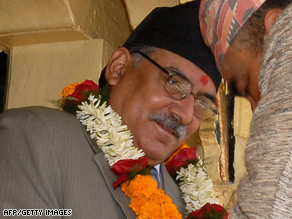
Nepal’s prime minister said Monday he will resign to save what he called the country’s "infant democracy."
It is the latest fallout over the status of Nepal’s army chief, Gen. Rookmangud Katawal. The Maoist government sacked Katawal on Sunday. Hours later, President Ram Baran Yadav reinstated him. Prime Minister Pushpa Kamal Dahal, commonly known as Prachanda, resigned on Monday, citing a serious political crisis caused by the president’s “unconstitutional” order. “The dual powers that have been unconstitutionally established in the country must end under any circumstance,” Prachanda said in a televised address announcing he would resign from the country’s Cabinet. Prachanda is the leader of the Communist Party of Nepal, which had been the largest party in Nepal’s coalition government until it recently withdrew. The former guerilla leader headed a decade-long bloody Maoist insurgency to abolish the country’s monarchy before being sworn in as prime minister in August.
Don’t Miss
Nepal government splits over general’s firing
In his address on Monday, Prachanda blamed certain political parties and “power centers” for “striking at our democracy, constitution and the peace process by putting the president in the forefront of the controversy over the chief of army staff.” “This has raised concerns over our infant democracy and the peace process,” he said. “I appeal to the people, civil society and political powers to be committed to the struggle for establishing a democratic Nepal.” Nepal’s interim constitution gives the president powers as supreme commander of the army and guardian of the constitution. Yadav’s spokesman said the president had the support of 18 parties in parliament when he reinstated the army chief. The decision to fire Katawal touched off protests. Supporters of both sides in the dispute took to the streets on Sunday. Despite sporadic clashes between the two factions, there were no serious injuries reported. The Cabinet voted to dismiss Katawal after the military refused the government’s order to stop recruiting about 3,000 new soldiers to fill vacant positions when it has yet to take in former Maoist rebels, as a 2006 peace deal required. It is unclear if the government will fall, since Madhesi Janadhikar (People’s Rights) Forum, another coalition partner and the fourth largest party in parliament, is undecided about staying in the government. The Maoists laid down their arms and won power in 2008 elections after an agreement that ended a decade-long insurgency. Under the deal, more than 19,000 former insurgents were to be integrated into the country’s security forces.